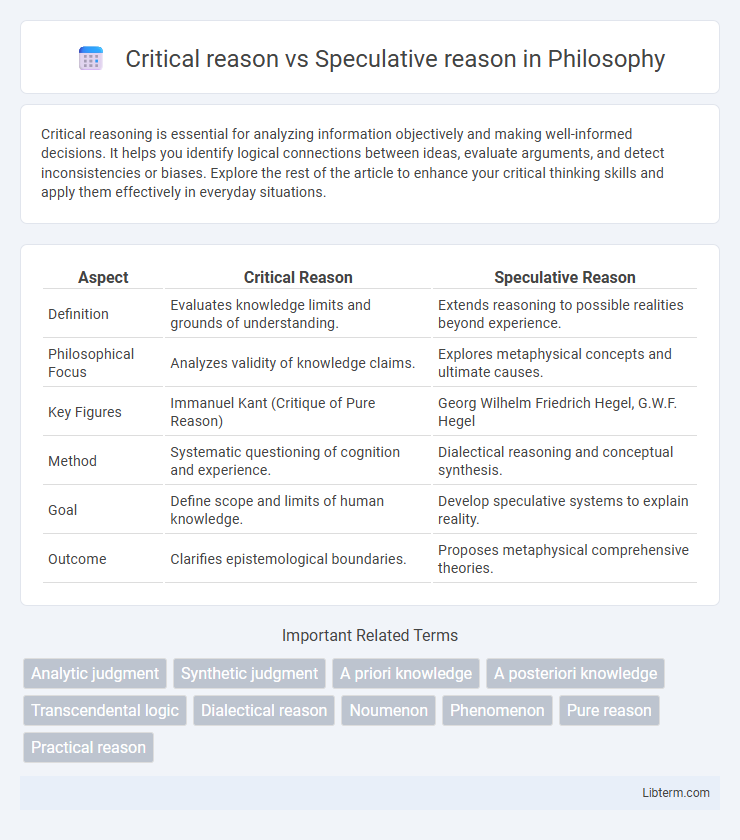Critical reasoning is essential for analyzing information objectively and making well-informed decisions. It helps you identify logical connections between ideas, evaluate arguments, and detect inconsistencies or biases. Explore the rest of the article to enhance your critical thinking skills and apply them effectively in everyday situations.
Table of Comparison
| Aspect | Critical Reason | Speculative Reason |
|---|---|---|
| Definition | Evaluates knowledge limits and grounds of understanding. | Extends reasoning to possible realities beyond experience. |
| Philosophical Focus | Analyzes validity of knowledge claims. | Explores metaphysical concepts and ultimate causes. |
| Key Figures | Immanuel Kant (Critique of Pure Reason) | Georg Wilhelm Friedrich Hegel, G.W.F. Hegel |
| Method | Systematic questioning of cognition and experience. | Dialectical reasoning and conceptual synthesis. |
| Goal | Define scope and limits of human knowledge. | Develop speculative systems to explain reality. |
| Outcome | Clarifies epistemological boundaries. | Proposes metaphysical comprehensive theories. |
Introduction to Critical and Speculative Reason
Critical reason evaluates beliefs and claims through logical analysis and empirical evidence, fostering clarity and sound judgment. Speculative reason explores abstract ideas and fundamental principles beyond empirical observation, aiming to understand metaphysical and ontological questions. Both forms of reason underpin philosophical inquiry by balancing practical critique with theoretical exploration.
Defining Critical Reason
Critical reason refers to the faculty of rational thought that involves analyzing, evaluating, and reflecting on ideas based on evidence and logical principles. It emphasizes objectivity, systematic questioning, and the pursuit of truth through rigorous argumentation and skepticism. This mode of reasoning contrasts with speculative reason, which tends to rely on abstract theorizing without empirical grounding.
Understanding Speculative Reason
Speculative reason involves exploring abstract concepts without immediate practical application, emphasizing the formulation of hypotheses and metaphysical inquiries. It contrasts with critical reason, which rigorously evaluates arguments and evidence to establish validity and truth. Understanding speculative reason requires recognizing its role in generating ideas that challenge existing paradigms and expand the boundaries of philosophical thought.
Historical Development of Both Concepts
Critical reason emerged prominently in the Enlightenment era, emphasizing rational inquiry and empirical evidence to challenge traditional authorities and beliefs, as seen in the works of Immanuel Kant who defined it as the capacity to question and judge knowledge itself. Speculative reason, rooted in German Idealism and earlier metaphysical traditions, sought to transcend empirical observation by exploring the fundamental nature of reality and existence, exemplified by philosophers such as Fichte, Schelling, and Hegel. The historical development of these concepts marks a philosophical tension: critical reason demands rigorous skepticism and clarity, while speculative reason embraces abstract theorization and synthesis, shaping modern debates in epistemology and metaphysics.
Key Philosophical Figures and Their Contributions
Immanuel Kant revolutionized philosophy by distinguishing critical reason, which seeks to evaluate the limits and validity of knowledge, from speculative reason, which pursues metaphysical claims beyond empirical evidence. Georg Wilhelm Friedrich Hegel expanded speculative reason by developing his dialectical method, emphasizing the synthesis of contradictions within reality and thought. Contemporary philosopher Karl Popper critiqued speculative reason's unfalsifiable assertions while endorsing critical reason through empirical falsification and scientific rigor.
Methodologies: Critical vs Speculative Reasoning
Critical reasoning employs systematic methodologies such as logical analysis, evidence evaluation, and structured argumentation to assess validity and soundness in arguments. Speculative reasoning relies on imaginative methodologies, including hypothesis generation, abstract theorizing, and conceptual exploration, often without immediate empirical verification. Critical reasoning prioritizes objective criteria and falsifiability, while speculative reasoning embraces broader, often untestable possibilities to stimulate innovative thinking.
Strengths and Limitations of Critical Reason
Critical reason excels in evaluating arguments based on evidence and logical consistency, promoting clarity and objectivity in decision-making. Its strength lies in minimizing biases and grounding conclusions in verifiable data, enhancing rational discourse. However, critical reason may be limited by its dependence on available information and can struggle with abstract or hypothetical scenarios that require creative or speculative thinking.
Strengths and Limitations of Speculative Reason
Speculative reason excels in exploring abstract concepts and generating innovative ideas beyond empirical evidence, fostering creative problem-solving and theoretical advancements. Its limitations include a tendency toward ambiguity and lack of practical verification, which can lead to speculative conclusions detached from reality. Speculative reason's strength lies in hypothesis formation, while its weakness is the potential for unverifiable or exaggerated claims.
Real-world Applications and Impacts
Critical reason underpins evidence-based decision-making in fields like law, medicine, and engineering, where rigorous analysis ensures safety, accuracy, and ethical standards. Speculative reason drives innovation and creativity in research, philosophy, and theoretical sciences by exploring possibilities beyond current empirical limits. The balance between critical and speculative reasoning fosters practical advancements while enabling visionary breakthroughs, shaping technological progress and societal development.
Integrating Critical and Speculative Approaches
Integrating critical and speculative reason enhances philosophical inquiry by combining rigorous analysis with imaginative hypothesis generation, promoting a balanced approach to problem-solving. Critical reason evaluates ideas through logical scrutiny and evidence, while speculative reason explores possibilities beyond immediate empirical verification, encouraging innovative thinking. Bridging these methods supports comprehensive understanding and advances knowledge across disciplines by fostering both evaluative rigor and creative exploration.
Critical reason Infographic

 libterm.com
libterm.com